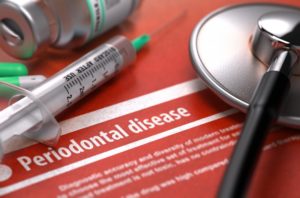 According to a study conducted by the Centers for Disease Control and Prevention, over half of American adults have gum disease. This common condition that wreaks havoc on your oral health has recently been connected to other medical conditions found throughout the body like heart disease, respiratory problems, kidney disease, and many others. Although it may sound like it’s impossible to combat because of all the issues it can lead to, gum disease in Woodstock is actually easily preventable with routine care. Read on to learn what recent findings say about this common disease and how you can protect your overall wellbeing.
According to a study conducted by the Centers for Disease Control and Prevention, over half of American adults have gum disease. This common condition that wreaks havoc on your oral health has recently been connected to other medical conditions found throughout the body like heart disease, respiratory problems, kidney disease, and many others. Although it may sound like it’s impossible to combat because of all the issues it can lead to, gum disease in Woodstock is actually easily preventable with routine care. Read on to learn what recent findings say about this common disease and how you can protect your overall wellbeing.
What is Gum Disease?
When food particles and your saliva mix together, they form a sticky film called plaque that coats your teeth. Harmful oral bacteria attach themselves and feed off of it, meaning the more plaque and tartar buildup you have, the more bacteria that will be present in your mouth. These bacteria then release substances like acid that erode your enamel, and toxins that are the cause of several gum disease symptoms including:
- Swelling
- Redness or discoloration
- Bleeding while brushing
- Inflammation
- Irritation
- Chronic bad breath
- Loose teeth
- Tooth loss
When the infection is spotted and treated in its early stages with periodontal therapy in Woodstock, your dentist can ease your discomfort and even reverse the symptoms. However, when it’s left to become more severe, the condition can become irreversible, and the only thing your dentist can do is minimize the effects the symptoms have on your mouth.
What Problems Can Gum Disease Cause?
When plaque and food debris aren’t regular cleared from your mouth by brushing and flossing, they can create a bacterial breeding ground. Researchers found that the same inflammation-causing toxins released by harmful oral bacteria can get into the bloodstream and travel throughout the body, resulting in other medical conditions such as:
- Heart disease
- Pregnancy and birth complications
- Respiratory infections
- Alzheimer’s
These findings have made it even more important to spot and treat gum disease early in an attempt to protect your overall health. Researchers have also hypothesized that other conditions like eating disorders, rheumatoid arthritis, and certain cancers are also linked to this disease as well.
How Can You Protect Your Mouth?
Protecting your oral and overall health is easier than you think. With routine preventive care from your dentist and a good oral hygiene routine, you will be able to keep your teeth and gums in tip-top shape and ward off any lingering oral health problems. Some tips to protect your mouth include:
- Brushing your teeth for two minutes twice each day.
- Flossing daily.
- Using antibacterial mouthwash regularly.
- Adjusting your diet to include less sugary and acidic products.
- Replacing your toothbrush every three months.
- Scheduling semi-annual checkups and cleanings with your dentist.
- Avoid bad oral habits like tobacco use.
If you notice that you are exhibiting any symptoms of gum disease, don’t hesitate to contact your dentist as soon as possible. Taking time to care for your mouth is also an investment of time in maintaining your overall health.
About the Author
Dr. Haren Patel has over 15 years of experience in dentistry and is passionate about providing his patients with high-quality dental treatments. He understands the importance of preventive care and how it can impact your overall health, which is why he conducts thorough checkups and cleanings and develops individualized treatment plans for his patients. He is more than happy to care for patients of all ages! For questions or to schedule an appointment for periodontal therapy, visit Dream Dental’s website or call 770-592-7000.
